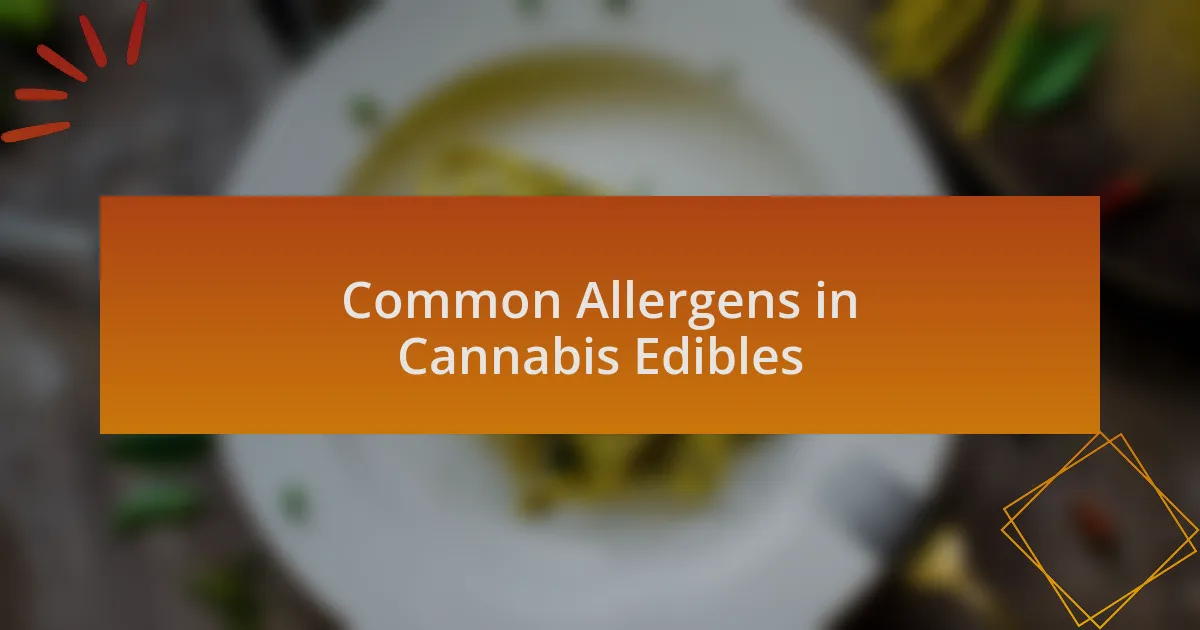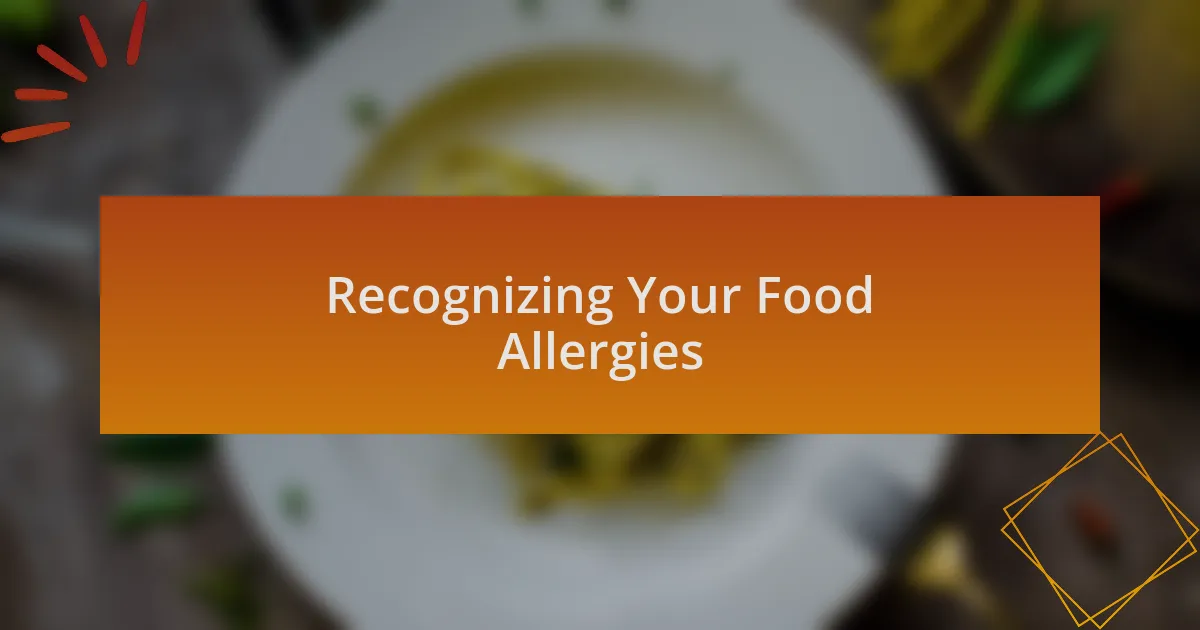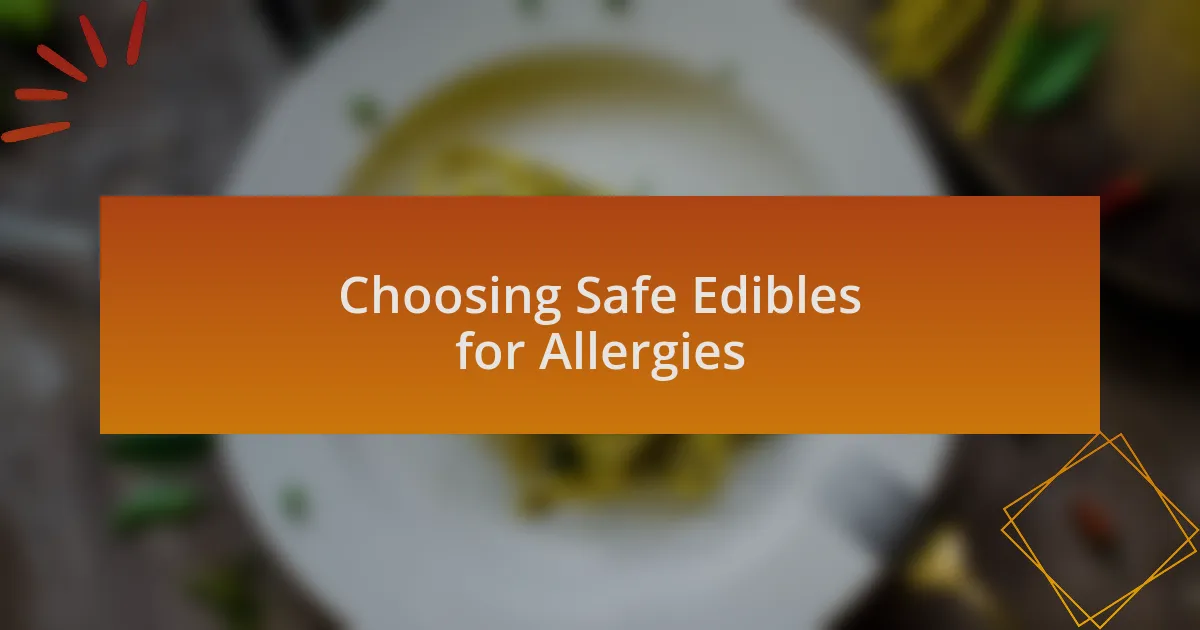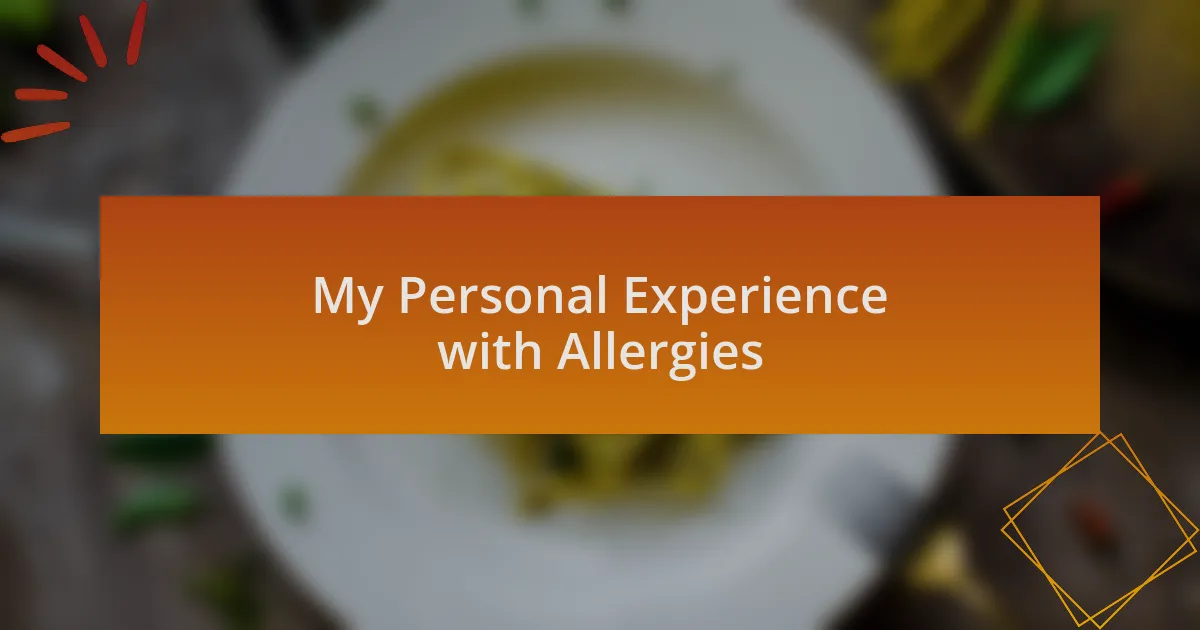Key takeaways:
- Cannabis edibles offer a unique and potent alternative to traditional consumption methods, providing prolonged effects and a variety of flavors suitable for different dietary needs.
- Understanding ingredient labels and potential allergens, such as gluten and dairy, is essential for safe consumption, particularly for those with food sensitivities.
- Keeping a food diary can help identify personal food allergies and triggers, emphasizing the importance of self-awareness in dietary choices.
- Choosing safe edibles involves researching brands for transparency, tasting small amounts first, and being proactive in managing allergies to enhance enjoyment.

Understanding Cannabis Edibles
Cannabis edibles are fascinating because they provide a unique way to experience the benefits of cannabis beyond smoking or vaping. I remember the first time I tried a cannabis-infused brownie; the flavors melded so perfectly, I had to remind myself it was more than just dessert. This culinary approach to cannabis opens doors for both enjoyment and therapeutic use, but it also raises the question: how do the effects differ from other consumption methods?
The way cannabis edibles work in the body can be quite distinct from traditional methods of consumption. When I first started exploring edibles, I was surprised to learn that they take longer to kick in but can deliver a much more potent and prolonged effect. Have you ever been in that situation where you’re eagerly awaiting the effects, only to find yourself overindulging because you didn’t feel anything right away? That’s a common experience, and it’s important to approach edibles with patience and caution.
Another aspect that intrigues me is the variety of flavors and formulations available, tailored to different preferences and dietary restrictions. I recall a friend who was gluten-free and skeptical about enjoying cannabis because of his dietary concerns. It was heartwarming to see him delighted by a gluten-free cannabis-infused gummy, feeling included in an experience he thought was out of reach. This highlights how cannabis edibles not only cater to our taste buds but also help create inclusive experiences, making cannabis accessible to everyone, regardless of dietary limitations.

Benefits of Cannabis Edibles
The benefits of cannabis edibles extend well beyond their enticing flavors. I still remember my first experience with a micro-dosed peanut butter cup. It was a revelation! Not only did it satisfy my sweet tooth, but it also provided a wave of relaxation without the anxiety I sometimes face with smoking. Have you ever wished for a way to unwind without feeling overwhelmed? Edibles can deliver that balance.
Another significant advantage is their discreet nature. I often find myself enjoying cannabis edibles like chews or chocolates while out with friends. They are subtle enough to avoid drawing any unwanted attention. This discreet consumption method can be a game-changer for those looking to integrate cannabis into social settings without feeling self-conscious. When was the last time you enjoyed a sweet treat without worrying about the stigma surrounding cannabis?
Moreover, the longer-lasting effects of edibles can be a blessing for individuals seeking relief from chronic pain or anxiety. I have a close friend who has battled migraines for years. She found that a single cannabis-infused cookie can keep her symptoms at bay for hours. The fact that these edibles provide sustained relief allows for a greater quality of life, allowing her to engage in activities she once avoided. Could this extended effect be the answer for those seeking a more manageable way to cope with their conditions?

Common Allergens in Cannabis Edibles
When it comes to cannabis edibles, common allergens are a critical concern for many of us. One notable allergen is gluten, which is often present in baked goods like brownies or cookies. I remember attending a gathering where a friend, who has celiac disease, unknowingly ate a gluten-laden edible, and the aftermath was quite uncomfortable. Have you ever witnessed how critical it is for people with food sensitivities to know exactly what’s in their treats?
Another common allergen is dairy, often found in the form of butter or cream in various edibles. A while back, I tried a delicious-looking chocolate truffle at a dispensary, only to find out later that it contained dairy. As someone who tends to avoid lactose, I felt disappointed. It emphasizes the importance of transparency in labeling; knowing which ingredients are used can make a huge difference for someone with dietary restrictions.
Nut allergies present a unique challenge as well. For instance, I’ve seen many products enticingly marketed with nut flavors, leading to unfortunate situations for those allergic. It really hits home when you consider how such simple joys, like enjoying a flavored edible, can turn into a source of anxiety for someone with allergies. So, when you’re indulging in cannabis edibles, how can you ensure you and your friends are safe? Always do your homework and look for allergen labels or ask questions before you indulge.

Recognizing Your Food Allergies
When it comes to recognizing food allergies, the first step is understanding your own body’s reactions. I remember the first time I tried a cannabis-infused gummy; shortly after, I felt a strange unease that kept me wondering if it was the edible or just my imagination. This experience made me realize how crucial it is to connect the dots between what I consume and how my body feels afterward.
In my journey to identify my food allergies, I learned the importance of keeping a food diary. Documenting what I ate and any subsequent symptoms helped me to pinpoint specific triggers. Have you ever experienced discomfort after a meal and brushed it off? I did, until I realized that being attentive to those signs could prevent larger health issues down the line.
The role of labeling cannot be overstated. I once purchased a delicious-looking chocolate bar from a local shop, only to find it contained hidden allergens after reading the fine print. That taught me a valuable lesson: always check the labels, and don’t hesitate to engage with vendors about the ingredients. How often do we forget that asking questions is not just okay, but essential for our safety? Trust me, taking that extra step can make all the difference for someone managing allergies while exploring the world of cannabis edibles.

Choosing Safe Edibles for Allergies
Choosing safe edibles for allergies can feel overwhelming, but it starts with thorough research. I remember the time I opted for a homemade cannabis tincture, only to later discover it was processed in a facility that also handled nuts. That moment taught me that cross-contamination is a real concern and propelled me to ask more questions before sampling any edible. Have you ever closely examined where your products come from? Understanding the source can dramatically affect your safety.
When choosing edibles, prioritize brands that offer transparency regarding their ingredients and allergen information. I often find myself gravitating toward companies that provide detailed labels and third-party testing results. This means you can trust that what you’re consuming not only is free from allergens but also meets quality standards. Doesn’t it feel reassuring to know what’s really in your food?
Something I’ve learned the hard way is to always taste-test a small amount first. I once dove headfirst into a beautifully packaged cannabis brownie and was hit with a wave of anxiety afterward about its contents. Starting with a small piece not only helps gauge your body’s reaction but also eases that fear of an allergic response. Taking it slow is essential—what’s more important than ensuring your safety and enjoyment?

My Personal Experience with Allergies
Experiencing allergies has reshaped the way I approach everything I consume. I vividly recall my first encounter with an edible that caused an unexpected reaction. It was a simple cookie, but the next hour was filled with discomfort and panic, as I realized too late it may have contained traces of dairy, something my body cannot handle.
I often reflect on how exhausting it can be to navigate social situations involving food, especially when cannabis edibles are involved. There have been gatherings where I’ve had to politely decline dessert while my friends indulged, feeling like a pariah in a chocolate-infused paradise. It reminds me of how crucial it is to communicate my dietary restrictions and educate others about ingredients that could affect someone’s experience.
I have developed a habit of keeping my own stash of allergy-friendly edibles. I remember whipping up some homemade gummies infused with coconut oil—carefully crafted with ingredients I know are safe for me. This process not only gives me peace of mind but also allows me to enjoy the experience alongside friends without the anxiety of an allergic reaction. Do you find joy in sharing your food experiences, or do allergies hold you back? For me, being proactive has transformed my experiences from ones of fear to ones filled with anticipation and joy.